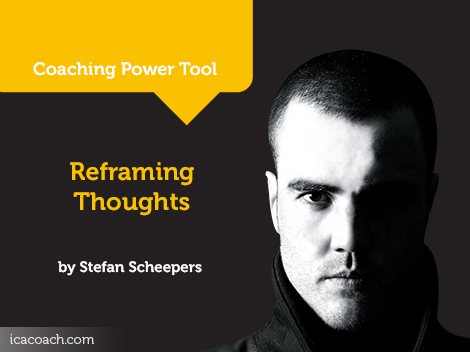A Coaching Power Tool Created by Stefan Scheepers
(Life Coach, UNITED STATES)
Emotion affect behavior and thought.
Thought affects behavior and emotion.
Behavior affects thought and emotion.
Example of a negative, self-reinforcing, pattern.
Emotions:
- Dread
- Unmotivated; no drive; no purpose
- Unenthusiastic
- Fear
Thoughts
- I am not good enough
- I will fail
- I am a failure
Behavior:
- Procrastination (escapism)
- Isolating from friends and family (escapism)
Procrastination and isolation perpetuate feelings of fear and dread as well as thoughts of being a failure which fuels the need to procrastinate and isolate. This pattern repeats and reinforces itself and creates a self-fulfilling prophesy which is the evidence needed to continue to repeat the pattern.
As we go through life we develop habits of thinking, feeling, and behaving that help us best cope with our environments. Unfortunately, what often happens is we get stuck in a negative, unhelpful pattern (habit) that can affect every area of our lives. Breaking out of obstructive patterns can literally change your entire life completely, forever.
Unhelpful thinking styles
- Black and white thinking. Seeing yourself and the world in extreme categories. Compromise gets overlooked and there are no grey areas.
- Emotional reasoning. Feelings are seen as judgments of who you are. You draw conclusions based on how you feel.
- When you dwell on the worst possible outcome without considering other possibilities.
- Personalization and blame. Relating everything around you to yourself, especially the negative.
- Should and must statements. Having fixed ideas about how things “should” be and then getting upset when your rigid demands on others are not met.
- Filtering out positive events and then tending to look only at the negative details when making conclusions.
- Disqualifying the positive. Ignoring the positives in a situation because you tell yourself they do not count.
- Over generalizing. Focusing on negative outcomes of one or more limited situations and then using those outcomes to make broad, general conclusions about life. You over generalize when you use words like: never, always, every, all, everybody, nobody, and none.
- Mind reading. When you believe you know what others are thinking and feeling and so ignore other more plausible possibilities.
Self-Application / Coaching Application
How to challenge negative thoughts.
- Describe a situation. Write down what thoughts, feelings, and behaviors were present.
- Ask yourself: “What does this situation say about me?” Start your answers with: I am…, I should…, or I must…. These answers are your automatic thoughts.
- Make a comprehensive list of all the reasons why your automatic thoughts are correct.
- Make a comprehensive list of all the evidence you have against your automatic thoughts.
- Write down all the unhelpful thinking styles that have played a part in creating your perceptions about your situation.
- Create a replacement thought that considers all the evidence you’ve given.

